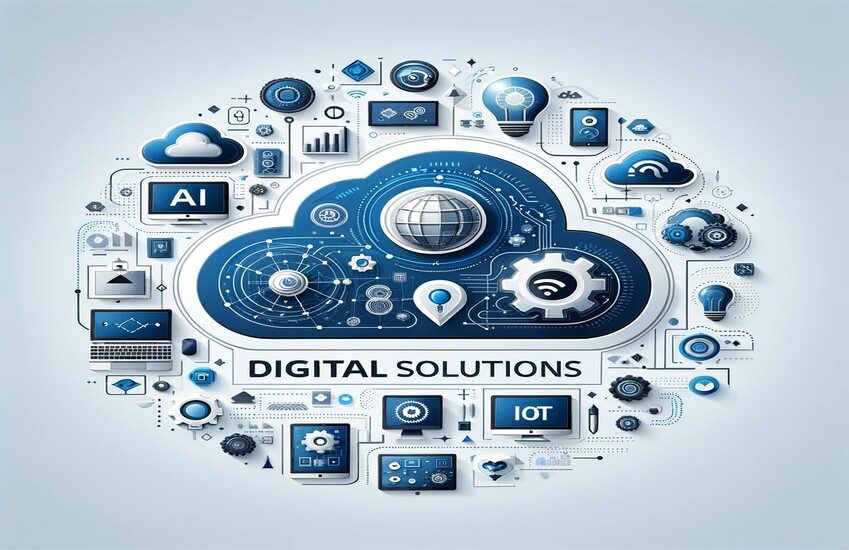Businesses are constantly looking for ways of staying in front of the competition and keeping up with today’s fast-paced digital world while also being able to adapt as technology evolves. The emergence of digital solutions, which transform the way companies operate and engage with their customers, has been a major development in recent years. Digital solutions cover many technologies and applications designed to address traditional challenges in new and effective ways. Here, we discuss modern companies’ digital solutions and their benefits, future, and impact on the corporate world.
Types of Digital Solutions
1. Cloud Computing
Cloud computing provides businesses with a wide range of infrastructure and computing resources as services that can be accessed over the Internet. Companies can reduce IT costs, increase flexibility, and scale operations on demand through Amazon Web Services, Microsoft Azure, and Google Cloud solutions.
2. Big Data Analytics
To discover patterns, trends, and insights, big data solutions require the processing and analysis of large amounts of data. Businesses are helping to make better decisions, anticipate customer behavior, and tailor services by using tools like Hadoop, Spark, or Big Data Processing Platforms.
3. Artificial intelligence and machine learning
Artificial intelligence and machine learning are at the forefront of digital innovation, enabling businesses to automate complex processes, optimize operations, and improve decision-making. Applications include automated customer service robots, advanced data analysis, and pattern recognition systems.
4. Internet of ThingsIoT
Internet of Things technologies connect physical devices to the Internet, enabling data exchange and automation in different environments. The Internet of Things can help businesses manage equipment, optimize logistics, improve safety, and promote interconnectivity among digital assets and real estate.
5. Blockchain
Although often associated with cryptocurrencies, the use of Blockchain technology to ensure transparency, security, and efficiency in digital transactions has broader applications. Businesses use blockchains to streamline supply chains, secure digital contracts, and preserve tamper-proof documents.
What are the effects of digital solutions on businesses?
1. Increased Efficiency
Businesses can implement digital solutions to simplify routine tasks, enhance the functioning of processes, and achieve greater levels of productivity. This enables employees to concentrate on more strategic and value-adding activities, which in turn drives the growth of businesses.
2. Enhanced Data-Driven
With digital solutions, businesses can access vast amounts of data to help them make informed decisions. Companies can optimize their strategies and achieve better results by analyzing the behavior of customers, market trends, and operational performance.
3. Improved Customer Experience
Businesses can engage customers in real time, offer personalized experiences, and respond to customer needs more efficiently through technology solutions. Companies embracing digital solutions are gaining a competitive edge over those not yet adopted in the current competitive business environment. Businesses can position themselves for long-term success through the use of technology to innovate and adapt to changing market conditions.
4. Reduce Operational cost
By implementing digital solutions, businesses can reduce operational costs, streamline processes, and eliminate inefficiencies. Companies can also eliminate the need for expensive hardware and maintenance, leading to substantial cost savings over time as they migrate to cloud solutions.
5. Innovation and Competitiveness
Companies that adopt digital solutions have a competitive edge compared to those that don’t, as part of today’s competitive business landscape. Businesses can achieve long-term success by using innovative technologies and adapting to market changes. Businesses can use modern digital technologies to gain an edge and increase their competitiveness, enabling them to compete in the market by introducing new products or services.
Impact on Modern Businesses
Traditional business models have been transformed by adopting digital solutions, enabling companies to be more global and responsive. This has led to changes in how businesses engage with customers, manage their activities, and compete in the market. Organizations that effectively leverage digital solutions are better positioned to adapt to changing market conditions and consumer expectations.
The Future of Digital Solutions on Businesses
Digital solutions for businesses of all sizes are becoming more and more relevant with the development of technology. It drives growth and success in the new business world, from increasing customer satisfaction to streamlining operations.
Digital transformation is the key to business success
Digital transformation is one of the most important trends shaping businesses’ future. Using the power of technology to change business processes and create value for customers is called “digital transformation.” By adopting Digital Solutions, businesses can streamline their processes, increase efficiency, and gain a broader customer experience.
The impact of AI
Artificial intelligence (AI) revolutionizes how businesses operate and interact with customers. The AI-powered solutions transform how businesses interact with their audience, from chatbots that provide immediate customer support to personalized product recommendations. Businesses can use the power of AI to manage repetitive tasks, gain valuable insight from data, and deliver personalized experiences that promote customer loyalty and satisfaction.
The rise of the Internet of Things in business operations
Another technology shaping the future of businesses is the Internet of Things. IoT devices like sensors and smart appliances allow businesses to gather accurate time information, optimize processes, and make more informed choices. The Internet of Things transforms how businesses operate and manage their operations, from supply chain management to asset tracking. Businesses can gain efficiency, reduce costs, and improve customer satisfaction by integrating Internet of Things into their business practices.
The importance of cyber security in the digital age
Cyber security has become a top priority for organizations of all sizes as businesses continue to move their operations online. Businesses must take strong cybersecurity measures to protect confidential information and digital assets as threats from cyber-attacks and data breaches continue to increase. Businesses need to take active steps to secure their digital infrastructure and guard against possible cyber threats, such as implementing encryption technologies or carrying out regular safety audits.
Adapting to the future of digital solutions
Finally, adopting digital solutions that drive innovation, efficiency, and growth is crucial to businesses’ future. Businesses must leverage the latest technologies, such as AI, Internet of Things, and cybersecurity, to keep pace with changing customer needs. Businesses can position themselves for success in the Digital Age and become a sustainable competitive advantage within an ever-changing business environment through investment in digitization initiatives and the adoption of leading edge solutions.
End Lines
For businesses that are intent on maintaining their competitiveness and responsiveness in the Digital Age, it is not necessary to provide such a solution. From cloud computing to AI, these technologies are reshaping industries, driving innovation, and creating new opportunities for growth and efficiency. As technology evolves, it will be essential for businesses looking to achieve sustained success in an increasingly digital world to adopt a strategy of using digital solutions.















Leave a Reply